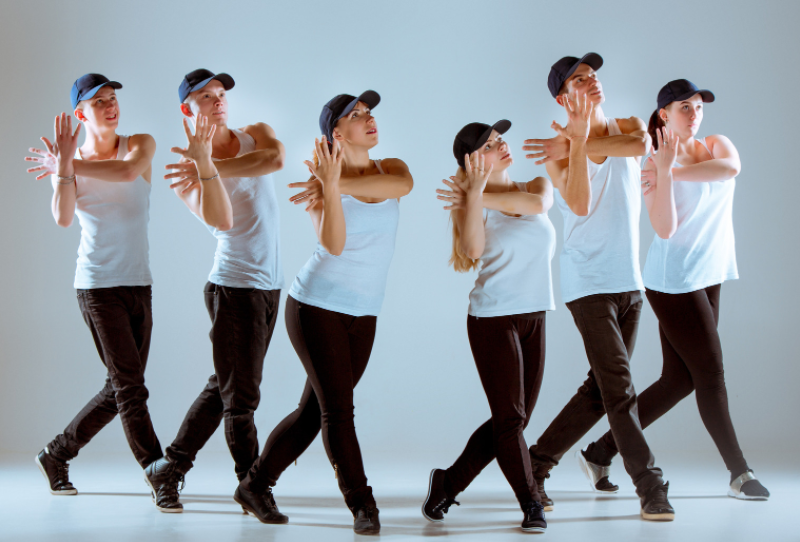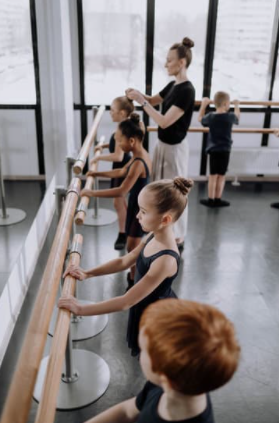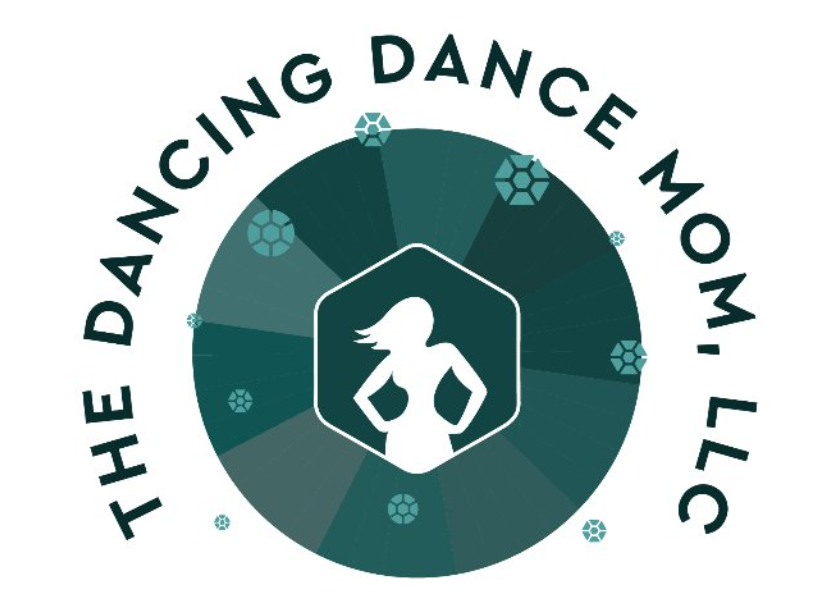Whatever the reason for it, choosing a new school for your young dancer is an important decision. After all, your children will spend countless hours in the studio, especially if they are a part of a competitive team. For many families, the dance school or studio is like a second home for the kids, so it makes sense to invest the time and effort into researching your options before settling on one.
What Are You Looking For?
Signing up for a school just because it has a great reputation may not work out for your dancer. Dance education should not be approached with a one-size-fits-all philosophy. Your child has (or will develop) unique needs and goals, and to grow in a positive direction, they need to be addressed and nurtured. The truth is that every school will NOT be able to deliver what your dancing child needs.
First, you need to think about what you and your dancer hope to get out of the experience. Are you looking for a strong ballet program, competitive team, wide variety of classes, family-like atmosphere, dance career preparation, etc.? Set aside time to sit down with your dancer to brainstorm a list of his/her goals, preferably BEFORE you start your search. Create a list of “must-haves” and “wish” characteristics to guide you, keeping in mind that you probably won’t get everything you need and want in one school.
You will have more success with finding a studio that aligns with your dancer’s needs if you have an idea of what you’re looking for BEFORE you start your search.
The Philosophy

Ideally, the dance school’s philosophy should drive every single decision the staff makes. Some examples include:
- “At ___ Dance School, we strive to provide a safe, fun atmosphere for our students to enjoy the performing arts while making lifelong friendships.”
- “Here at ___ Dance Academy, our goal is to provide top-notch dance instruction and to support each child as they mature into confident, strong young adults.”
- “Our focus at ___ Dance Studio is to prepare our students for their futures as professional artists.”
Keep in mind that none of these is wrong! But more than likely, one of these examples “spoke” to you more than the others. You might have to do a little digging to find out what the prospective studio’s philosophy is, but it is an important step in the journey to find a new dance school. Follow the studio on social media, check out their website, read reviews, or (better yet) try to arrange a conference or interview with the studio owner (SO) or studio director (SD).
Training and Education

For me, this is a big one. Hiring a well-educated, accomplished staff with solid credentials should be a priority for every SO/SD. Personally, I want to see that the owner/director is investing time and resources into his/her staff to make them top-tier, and to keep them learning and growing as they develop their craft even further (organizations like American Ballet Theater offer continuing education). Many SO’s will display the certificates from completed coursework on the school’s waiting room walls, or feature this information in a monthly newsletter, social media post, or other official correspondence.
Feel free to come right out and ask what continuing professional development the staff has recently completed (or plans to, in the near future). If the answer is “none,” that may be a red flag. Even with COVID restrictions in place in some parts of the country and world, many companies have offered virtual training sessions. With all the opportunities available, continuing the staff’s training and education is a reasonable expectation.
Communication

Things can change on a dime in the dance world, so the SO/SD should communicate with their families regularly (especially during “busy” seasons). Call times, dress codes, venue information, calendar events, etc. are just too important to miss, so knowing what platform you’ll be expected to check can save a lot of aggravation. Some schools use a private FB page, a shared Google Calendar, email newsletter, group texts, printed notices, waiting room bulletin board, or a mixture of multiple methods to keep families informed.
Here’s another one that resonates with me personally: parent meetings. While meetings can be somewhat inconvenient, I feel that having a meeting or two each year is crucial to maintaining the connection between the staff and parents. SO’s might have a parent meeting early in the dance year, and one later as a big event (recital or nationals, for example) approaches. Having some face-to-face interaction (even if it’s over Zoom) helps everyone feel prepared and on the same page.
When you send a message voicing a concern or asking a question, staff members should respond to you in a reasonable amount of time. However, it pays to keep your expectations realistic as well. If your question is about summer intensives but it’s January (and the team is preparing for competition season), hoping for a rapid response will only frustrate you and the staff. All communication should remain courteous and respectful on both sides.
Atmosphere

Many dancers refer to their teammates and teachers as their “dance family” because of how much time they spend together, and the bonds they form along the way. So it’s crucial to choose a school that matches the “vibe” you’re looking for.
The only real way to get your finger on the school’s pulse is to spend some time there (preferably with a trial class). While your dancer is inside, hang out in the waiting room to get a feel for what the dynamic is among the dance parents. Afterwards, ask your dancer how he/she was treated by the other dancers and staff. If something felt mildly “off,” consider giving it another chance if all of the other pieces fall into place. But if the atmosphere felt even a little bit toxic (i.e., a heated discussion of studio politics dominated the waiting room), move that studio further down your list.
Put in the Time

Yes, you will have to conduct some research to find answers to these questions, as well as schools to begin your process with. Take word-of-mouth recommendations, read online reviews, follow prospective schools on social media, and peruse the studio’s website before narrowing down your choices. Make a short list of candidates, and get ready to make some phone calls.
No Substitute for Face-to-Face
Ideally, you can arrange for your child to take a free trial class or two. Be sure to set this up in advance! You and your dancer will get answers to many of your questions based on that experience alone. If the SO/SD seems reluctant to allow your dancer to take a trial class, that may tell you all you need to know.
If the studio is on a break (or there is another reasonable circumstance that does not permit for a trial class), ask the SO/SD for a meeting for you to confer with each other. With all of the digital options available (Zoom, Meet, Teams, etc.), it is much easier to find a time that works for both parties than in the past. You may even choose to ask for a conference like this in addition to a trial class.
Without at least one in-person (or virtual) experience, it is nearly impossible to tell whether the school will be a good fit for your family. Think long and hard before signing a commitment for a studio that does not provide an opportunity for you to feel it out.
Things Change
As dancers grow, they change. Their needs and goals will shift, and the studio that once fitted them perfectly may not provide what they need any longer. Many dancers change schools at some point in their education, which is not necessarily a poor reflection on the studio or dancer. Think of the dynamic as a relationship – when one partner isn’t getting what he or she needs, it’s time to move on (see Time to Say Goodbye, Part 1).
If that happens, you may need to start this cycle over again. But putting in the time and effort now can pay big dividends over the course of your child’s dance career!
Work hard, have fun! – Danielle


We are so very grateful for the dance studio that we’ve chosen, here in Tennessee. This is a great article with terrific recommendations. Blessings!
You are definitely an expert on this topic. If my daughters want to go into dance in the years to come, I’m coming to you with all the questions!!
There are some great tips in here! My daughter has been with the National Ballet of Canada for five years and decided it was going in a direction where she didn’t want to continue. She now wants to learn other forms of dance and try competitive dance so we are in the early stages of our research right now!
That’s a lot of super information…my kids are not in dance but if they were you sound like the expert to follow.
It’s amazing how many kid’s activities seem like second homes. Great tips on choosing a school.
So many things to consider that I never had thought about!
None of our kids are in dance, but Danielle I love reading all your post. They are so refreshing.
This is fantastic advice! So so helpful!
Excellent advice! Many details to consider!
This is great info. I’m a piano teacher and a lot of the same advice would apply to finding the right piano studio.
Wow! Sounds like a serious process. We usually choose by whatever day of the week works:)). But I like your approach. I think if were serious about sport future, I would choose more careful.
Great ideas! Thank you!
You definitely know what you’re talking about, that’s obvious!
You have some excellent points! I remember the process my sister went through trying to find a gymnastics studio for my niece. It’s pretty important to do your homework and research!
Great tips. You are right that the expereince and attitudes of instructors are so imporant with any sport!
Wow! Great info & so many helpful tips on choosing the right one
Great tips! What dance studio you choose really does make a difference!
Excellent suggestions for selecting the right dance school!